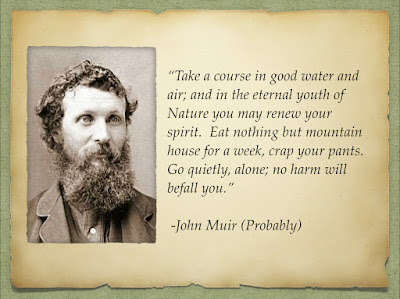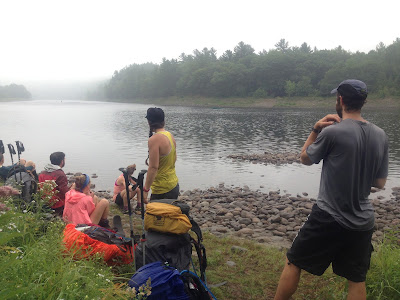Note: Originally published in 2015. While this post doesn't have the standard satirrific tone of the usual NHTM post, I wanted to do something with it, and FB notes (its original home) has become harder to find than my headlamp when I'm on an overnight.
Since writing this I have switched to using a bear canister, because maintaining possession of my food at all times -- even when going to the privy -- became more annoying than carrying a wee bit of extra weight. But I still believe that bear bagging is the worst method of food storage possible, short of just throwing it on the ground wherever.
I sleep with my food. There. I said it.
I’ve slept with my food in my tent while hiking in twenty-two different states, including ones that have Grizzlies. When legally required, I’ve used bear canisters (Kings Canyon, Yosemite) and hung food (Yellowstone). I’ve used bear boxes (New Jersey on the AT) as well as Bear Cables (GSMNP) and Bear Poles (SNP). But otherwise, I sleep with my food. And so do a lot of other people.Why? Simply put, I believe it to be the best strategy for protecting bears.
This statement is probably viewed incredulously by people who have been told over and over again by official agencies that sleeping with your food is a terrible idea, and that people who do it are lazy, irresponsible, and part of the problem. But stick with me, and I’ll explain my line of thinking.
I believe that one of the reasons that official sites post the proper hanging of food as a best practice doesn’t necessarily have anything to do with the efficacy of hanging food as a deterrent versus other methods of food storage. I think it has more to do with the perceived safety of the hiker, and the potential liability involved in the event of an attack rather than the result of any studies.
Which is to say, keeping your food in your tent could be 1,000 times more likely to prevent a bear from getting your food, and authorities would still never suggest it due to the relative potentially bad outcome (in the woods and in a courtroom) should a bear invade a tent, regardless of how unlikely that might be statistically. So if sleeping with your food decreases the chances of a bear getting it by a great margin, but increases only slightly the chance of you having an encounter with a bear, it won’t be recommended -- and that's true even if it's just the perception of an increase.
Funny enough, there's one group of authorities who will admit that hanging food is ineffective. And those authorities are in places that require the use of bear canisters.
I have often thought that hanging food isn’t necessarily about keeping food away from bears, but rather keeping bears away from people while they attempt to get people’s food. The argument would say something to the effect of, “well, the bear got my food, but at least I’m okay.” People who hang food aren’t terrified that a bear might get their food if they slept with it, but rather of what a bear might do to them while it was getting their food if they slept with it. Which is one of the reasons you end up with this sort of thing.
Much of what we do regarding bears and food is, as with water treatment, faith-based. If you hang food with success you are convinced that hanging food is why a bear didn’t get your food, whether there is a bear in the area or not. If you sleep with your food, and are never attacked, you believe that sleeping with your food is a successful strategy. When a bear does get food that is hung, the assumption on the part of those who hang food is that the food was improperly hung. Why? Because they have faith that a bear cannot get to properly hung food -- even though there are bears that have proven that they can learn to defeat just about any unattended system of protecting food (including bear canisters).
As for bears invading tents, it’s incredibly rare, despite the fact that at some point in a trip everything you own probably smells like food. On the very rare occasions that it does happen the first question anyone asks is, “did the hiker have food in their tent?” Why? Because people like to find a cause that tells then that they are relatively safe from this kind of thing, so that they can tell themselves that they don’t have to be afraid. “He had food in his tent and was attacked, I do not have food in my tent and therefore won’t be attacked.”
But even if you don’t have food in your tent, you still probably smell like food. You’ve spilled it on your clothing, you’ve stored it (and trash) in your backpack and your pockets, you’ve got some on your hands, your beard, your mouth. It’s not like you’re taking a shower every day, and storing toothpaste and sunscreen in your bearhang bag doesn't make your breath smell less like toothpaste or your skin smell less like sunscreen. Putting all “smellables” in a bag doesn’t mean your tent and its contents don’t smell like food. Funny enough, I've seen recommendations that included in the "smellables" you're supposed to hang are the clothes you cooked in. Ever seen anyone do that? I haven't. Ultimately, actually having food in your tent might not make it smell any more like food than not having it in your tent.
But there’s not much you can do about that, right? So you do what you can to minimize bad encounters, including (if you're like me) not cooking in camp and avoiding established campsites unless required to use them. And if your food doesn’t get taken and you remain unharmed, then whatever you’ve done worked (at least in your mind). Even if there were never any bears near you.
Are people who sleep with their food irresponsible and lazy? Undoubtedly some are. And then there are others who believe that it’s a better way of dealing with food and take maintaining possession at all times seriously, which, believe it or not, takes a fair amount of effort. Do I have any statistical evidence to back up my belief that bears recognize possession as ownership, and that they are more likely to go after hung, non-attended food rather than expend the energy to attack another animal to take its food? Nope. But then again, people who believe hanging is the best strategy don’t have any statistical analysis to back up their belief, either. If anyone has actual data showing that hanging food is a more effective strategy, I've never seen it. And no one has ever really successfully explained -- if maintaining possession is a bad strategy -- what hikers are supposed to do with their food while actually hiking. It's right there. In your backpack. Why aren't hikers constantly being assaulted by bears while walking?
On the other hand, you can imagine how quickly someone (or their family) would engage a lawyer if ATC suggested sleeping with food and a bear invaded a tent, regardless of how unlikely a scenario that might be, particularly if that hiker sustained injuries or was killed.
I sleep with my food. Should you? That’s really up to you. If having food in your tent is going to keep you awake all night, probably not. In fact, I’ve hung food when I’ve been around other hikers who were so worried about me not doing so that it seemed a kindness to hang my food so they could get some sleep.
I’m not suggesting what anyone else should or shouldn’t do. I’m explaining my reasoning for what I do, and the fact that it isn’t as lazy or irresponsible as you might have been led to believe.
I sleep with my food because I think it’s safer for the bears.






























